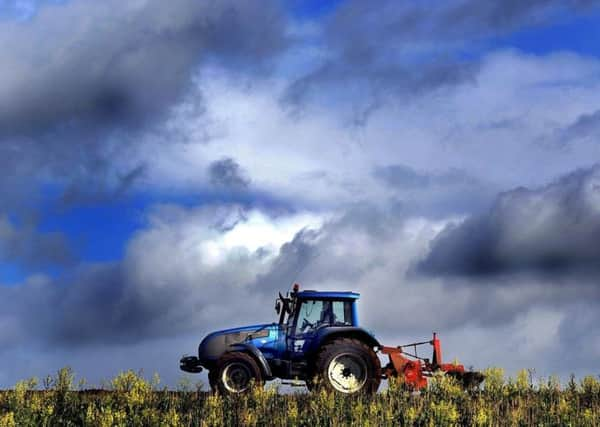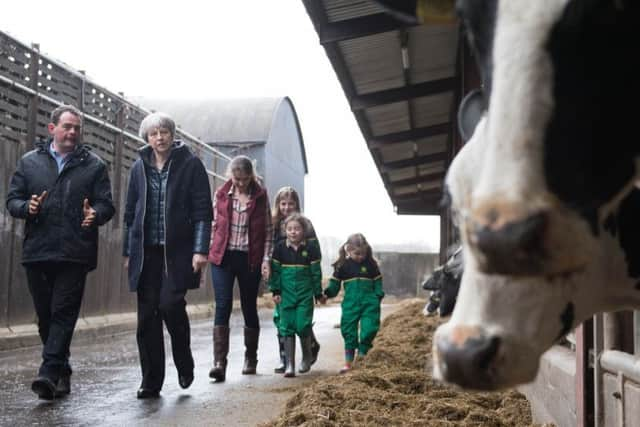Sarah Todd: No easy answers as farmers face uncertain times


This quote from former American president Dwight D Eisenhower seems particularly pertinent as Britain teeters on the threshold of 2019.
As we look ahead to the New Year, there is a gaping chasm between everyday life on the farm – the mucky end of the stick – and the sharply-suited (rather than boiler-suited) policy-makers.
Advertisement
Hide AdAdvertisement
Hide AdAt the time of the Brexit referendum, there was a lot of enthusiasm among farmers for shaking off the shackles of the European Union and becoming masters of their own destiny.


Interestingly, this pioneering spirit didn’t just come from within the ranks of the older generation. There were a lot of young farmers keen – coining a Theresa May phrase here – to take back control and forge a future free of the big brother stranglehold of European rules and regulations.
For the majority, farming is more of a way of life than a business proposition. Farmers aren’t in it for the short term. They never have been. For generations, everything they have done from planting crops to buying machinery, building sheds and breeding animals, involves thinking a good many years ahead.
This hardy bunch knew Brexit wouldn’t be easy but had – perhaps more than any other sector – the experience of playing the long game to see that hard work and a few lean years would probably be worth it. For many, their dream has been to create new markets and a rural economy that can stand on its own feet without the need for subsidies. Only time will tell whether this rural idyll finally comes to fruition.
Advertisement
Hide AdAdvertisement
Hide AdNow, like the rest of the country, there is fatigue and frustration among the farming fraternity.
While eyes have been taken off the ball because of the blessed Brexit negotiations, time hasn’t stood still in the countryside.
High on the list of worries for farming in 2019 must be veganism. Forever promoted on that supposed paragon of broadcasting impartiality the BBC, the diet trend has in what seems like the blink of an eye become mainstream. While we’ve been waiting for a deal from Brussels, the movement has upped its game and can no longer be dismissed as a mere fad.
The Agriculture and Horticulture Development Board (AHDB) has just produced a report on the outlook for UK agriculture for the coming year.
Advertisement
Hide AdAdvertisement
Hide AdLabour – or rather the lack of it – stands out as a big worry. Not just on-farm, but also in food processing factories and for haulage.
The report also raises particular concerns for pig farmers, with sales of fresh pork meat in decline and a drop in demand from China.
This year’s weather – the wet spring and then record-breakingly dry summer – means the report predicts a “tight” time for cereal crops. Likewise potatoes.
Not just farming itself, but wider rural communities have been silently suffering while we’ve been in the limbo land of Brexit negotiations. Any pretence of forward planning by local authorities seems to have gone out of the window.
Advertisement
Hide AdAdvertisement
Hide AdVillage schools, shops, pubs and vital transport links have all had shadows cast over them. Housing for the next generation – youngsters who have actually grown up in the countryside rather than affluent incomers – has never been tackled. How many young adults on an average wage will ever be able to afford a house among the community where they have grown up?
A couple of months ago, television presenter Chris Packham, who as an aside has recently become vegan (back to that BBC impartiality), said every primary school in the country should be “twinned” with a farm. What a wonderful idea, but with current risk assessments it’s complete pie in the sky that will never come to anything.
Back in the 1970s, my village primary school would informally bring a class around to my parents’ farm – a new foal, harvest or just a sunny afternoon and the sensible old teacher thinking it was too nice to be indoors.
Nowadays schools can’t take a child anywhere without at least three pages of form filling. Spontaneity within education has been dead in the water for decades.
Advertisement
Hide AdAdvertisement
Hide AdOnly time will tell how farming will fare over the coming year. There must be a very real worry that many small to medium sized traditional family-run farms won’t survive; unable to keep chasing the economies of scale needed to run at a profit.
In stark contrast to the huge factory-type concerns, there will be those who manage to make a living from diversifications such as farm shops, holiday cottages and animal park type visitor experiences. Not proper farming as we know it.
But wait. Let’s finish how we started, with another quote from the late former President Eisenhower: “Pessimism never won any battle.”
Sarah Todd is a former editor of Yorkshire Life magazine. She is a farmer’s daughter, mother and journalist specialising in country life.